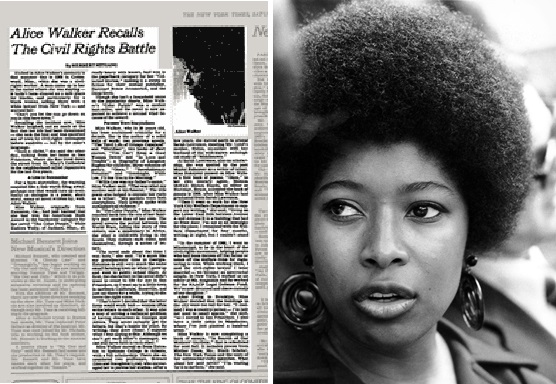|
| |
Alice Walker, The Civil Rights Movement: What Good Was It? (1967)
Alice Walker is most famous for the book and film The Color Purple (1982). One of eight siblings growing up in Eatonton, Georgia in the 1950s, she attended a segregated Black school, and went to University in New York. After graduation, she worked for the NAACP in Mississippi. In 1967, aged 23, she entered and won an American Scholar essay contest on: The Civil Rights Movement: What Good Was It? – a personal reflection on what the Civil Rights Movement meant to her. It is a wonderful article, which captures the hope and inspiration of those times, and you are recommended to read the whole essay here.
***
Some Quotes:“Someone said recently to an old black lady from Mississippi, whose legs had been badly mangled by local police who arrested her for 'disturbing the peace', that the civil rights movement was dead.... For such a woman the civil rights movement will never be over as long as her skin is black. It also will never be over for twenty million others with the same 'affliction', for whom the movement can never 'lay down', no matter how it is killed by the press and made dead and buried by the white American public.” “White liberals and deserting civil rights sponsors ... speak of ghetto riots, and of every area that has been touched by the civil rights movement as somehow or other going to pieces. They rarely talk, however, about human attitudes among Negroes that have undergone terrific changes just during the past seven to ten years (not to mention all those years when there was a movement and only the Negroes knew about it). They seldom speak of changes in personal lives because of the influence of people in the movement. They see general failure and few, if any, individual gains.” “It was just six years ago that I began to be alive. I had, of course, been living before, but I did not really know it.... I wanted to be an author or a scientist – which the color of the body denied.... I waited to be called to life. And, by a miracle, I was called.” “My mother had gotten used to watching the afternoon soap operas at the house where she worked as maid, and nothing could satisfy her on days when she did not work but a continuation of her'stories'. So she pinched pennies and bought a set. All these men and women were white and lived in houses with servants, long staircases that they floated down, patios where liquor was served four times a day to 'relax' them. But my mother, with her swollen feet eased out of her shoes, her heavy body relaxed in our only comfortable chair, watched each movement of the smartly coiffed women, heard each word, pounced upon each innuendo and inflection, and for the duration of these 'stories' she saw herself as one of them.... And when she turned to look at my father sitting near her in his sweat shirt with his smelly feet raised on the bed to 'air', there was always a tragic look of surprise on her face... She subordinated her soul to theirs and became a faithful and timid supporter of the 'Beautiful White People'. Once she asked me, in a moment of vicarious pride and despair, if I didn’t think that 'they' were 'jest naturally smarter, prettier, better'.... The heart that beat out its life in the great shadow cast by the American white people never knew that it was really 'good'.” “The face of Dr. Martin Luther King, Jr., was the first black face I saw on our new television screen. And, as in a fairy tale, my soul was stirred by the meaning for me of his mission ... I saw in him the hero for whom I had waited so long.” “Now there was a chance at that other that Jesus meant when He said we could not live by bread alone.... I have fought and kicked and fasted and prayed and cursed and cried myself to the point of existing. It has been like being born again, literally. Just 'knowing' has meant everything to me. Knowing has pushed me out into the world, into college, into places, into people.” “The real question, it appears to me, is not whether poor people will adopt the middle-class mentality once they are well-fed, rather, it is whether they will ever be well-fed enough to be able to choose whatever mentality they think will suit them.” “I think there are so few Negro hippies today because middle-class Negroes, although well-fed, are not careless. They are required by the treacherous world they live in to be clearly aware of whoever or whatever might be trying to do them in. They are middle-class in money and position, but they cannot afford to be middle-class in complacency.” “What good was the civil rights movement? If it had just given this country Dr. King, a leader of conscience for once in our lifetime, it would have been enough. If it had just taken black eyes off white television stories, it would have been enough. If it had fed one starving child, it would have been enough. If the civil rights movement is 'dead,' and if it gave us nothing else, it gave us each other forever.... It broke the pattern of black servitude in this country. It gave us history and men far greater than Presidents. It gave us heroes, selfless men of courage and strength, for our little boys to follow. It gave us hope for tomorrow. It called us to life.”
|
|
|
| |
